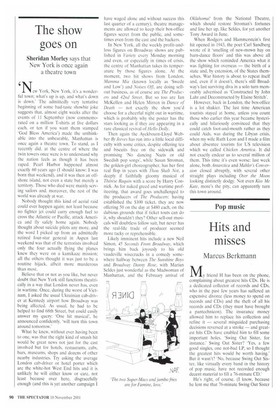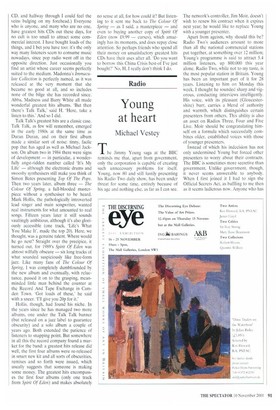Hits and misses
Marcus Berkmann
My friend H has been on the phone, complaining about greatest hits CDs. He is a dedicated collector of records and CDs, who in the past few years has suffered an expensive divorce (less money to spend on records and CDs) and the theft of all his records and CDs (they must have brought a pantechnicon). The insurance money allowed him to replace his collection and refine it — several misguided purchasing decisions reversed at a stroke — and greatest hits CDs have enabled him to fill some important holes. 'Swing Out Sister, for instance.' Swing Out Sister? 'Yes, a few good singles, one not-bad LP, so I thought the greatest hits would be worth having.' But it wasn't? 'No. because Swing Out Sister, like virtually every band in the history of pop music, have not recorded enough decent material to fill a 76-minute CD.'
He's right, of course. (I know, because he lent me that 76-minute Swing Out Sister
CD, and halfway through I could feel the veins bulging on my forehead.) Everyone who is anyone, and many who are no one, have greatest hits CDs out these days, for no cult is too small to attract some commercial interest. I have bought loads of the things, and I bet you have too: it's the only way many listeners seem to consume music nowadays, since pop radio went off in the opposite direction. Just occasionally you find an artist whose career seems perfectly suited to the medium. Madonna's Immaculate Collection is perfectly named, as it was released at the very moment that she became no good at all, and so includes none of the bilge she has recorded since. Abba, Madness and Barry White all made wonderful greatest hits albums. 'But then there's Talk Talk,' said H. 'Here, take a listen to this.' And so I did.
Talk Talk's greatest hits are a classic case. Talk Talk, as few will remember, emerged in the early 1980s at the same time as Duran Duran, and on their first album made a similar sort of noise: tinny, facile pop that has aged as well as Michael Jackson. On album two in 1984 there were signs of development — in particular, a wonderfully angst-ridden number called 'It's My Life' — although the electronic drums and swooshy synthesisers still make you think of Simon Bates presenting Top Of The Pops. Then two years later, album three — The Colour Of Spring, a full-blooded masterpiece without a synthesiser to be heard. Mark Hollis, the pathologically introverted lead singer and main songwriter, wanted real instruments for what amounted to real songs. Fifteen years later it still sounds vaultingly ambitious, although it's also gloriously accessible (one track, 'Life's What You Make It', made the top 20). Here, we thought, was a genuine talent. Where would he go next? Straight over the precipice, it turned out, for 1989's Spirit Of Eden was almost wilfully obscure — six long tracks of what sounded suspiciously like free-form jazz. Like many fans of The Colour Of Spring, I was completely dumbfounded by the new album and eventually, with reluctance, passed it on to the grasping, meanminded little man behind the counter at the Record And Tape Exchange in Camden Town. 'Got loads of these.' he said with a sneer. 'I'll give you 20p for it.'
Hollis, though, had found his niche. In the years since he has managed two more albums, one under the Talk Talk banner (but released on a jazz label to guarantee obscurity) and a solo album a couple of years ago. Both extended the patience of listeners to snapping point. But somewhere in all this the record company found a market for the band: a greatest hits release did well, the first four albums were re-released in smart new kit and all sorts of obscurities, remixes and so forth were issued, which usually suggests that someone is making some money. The greatest hits encompasses the first four albums (only one track from Spirit Of Eden) and makes absolutely no sense at all, for how could it? But listening to it sent me back to The Colour Of Spring — as I said, a masterpiece — and even to buying another copy of Spirit Of Eden (now £9.99 — curses), which amazingly has its moments, and does repay close attention. So perhaps friends who spend all their money on unsatisfactory greatest hits CDs have their uses after all. 'Do you want to borrow this China Crisis best-of I've just bought?' No, H, I really don't think I do.















































































































 Previous page
Previous page